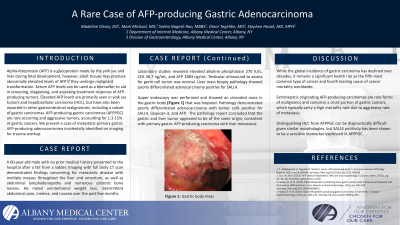Tuesday Poster Session
Category: Stomach
P4210 - A Rare Case of AFP-Producing Gastric Adenocarcinoma
Tuesday, October 24, 2023
10:30 AM - 4:00 PM PT
Location: Exhibit Hall

Has Audio

Madeline Cleary, DO
Albany Medical Center
Albany, NY
Presenting Author(s)
Madeline Cleary, DO1, Mark P. Michael, MD1, Sneha Nagesh Rao, MBBS1, Omar Tageldin, MD1, Stephen Hasak, MD, MPH2
1Albany Medical Center, Albany, NY; 2Albany Medical College, Albany, NY
Introduction: Alpha-fetoprotein (AFP) is a glycoprotein made by the yolk sac and liver during fetal development, however, adult tissues may produce abnormally elevated levels of AFP if they undergo malignant transformation. Serum AFP levels can be used as a biomarker to aid in screening, diagnosing, and assessing treatment response of AFP-producing tumors. Elevated AFP levels are primarily seen in yolk sac tumors and hepatocellular carcinoma (HCC), but have also been reported in other gastrointestinal malignancies, including a subset of gastric carcinomas. AFP-producing gastric carcinomas (AFPPGC) are rare occurring and aggressive tumors, accounting for 1.3-15% of gastric cancers. We present a case of metastatic primary gastric AFP-producing adenocarcinoma incidentally identified on imaging for trauma workup.
Case Description/Methods: A 60-year-old male with no prior medical history presented to the hospital after a fall from a ladder. Imaging with full body CT scan demonstrated findings concerning for metastatic disease with multiple masses throughout the liver and omentum, as well as abdominal lymphadenopathy and numerous sclerotic bone lesions. He noted unintentional weight loss, intermittent abdominal pain, melena, and nausea over the past few months. Laboratory studies revealed elevated alkaline phosphatase 270 IU/L, CEA 36.7 ng/mL, and AFP 2883 ng/mL. Testicular ultrasound to assess for germ cell tumor was normal. Liver mass biopsy pathology showed poorly differentiated adenocarcinoma positive for SALL4. Upper endoscopy was performed and showed an ulcerated mass in the gastric body [Figure 1] that was biopsied. Pathology demonstrated poorly differentiated adenocarcinoma with tumor cells positive for SALL4, Glypican-3, and AFP. The pathology report concluded that the gastric and liver tumor appeared to be of the same origin, consistent with primary gastric AFP-producing carcinoma with liver metastasis.
Discussion: While the global incidence of gastric carcinoma has declined over decades, it remains a significant health risk as the fifth most common type of cancer and fourth leading cause of cancer mortality worldwide. Extrahepatic originating AFP-producing carcinomas are rare forms of malignancy and comprise a small portion of gastric cancers, which typically carry a high mortality rate due to aggressive rate of metastasis. Distinguishing HCC from AFPPGC can be diagnostically difficult given similar morphologies, but SALL4 positivity has been shown to be a sensitive biomarker expressed in AFPPGC.

Disclosures:
Madeline Cleary, DO1, Mark P. Michael, MD1, Sneha Nagesh Rao, MBBS1, Omar Tageldin, MD1, Stephen Hasak, MD, MPH2. P4210 - A Rare Case of AFP-Producing Gastric Adenocarcinoma, ACG 2023 Annual Scientific Meeting Abstracts. Vancouver, BC, Canada: American College of Gastroenterology.
1Albany Medical Center, Albany, NY; 2Albany Medical College, Albany, NY
Introduction: Alpha-fetoprotein (AFP) is a glycoprotein made by the yolk sac and liver during fetal development, however, adult tissues may produce abnormally elevated levels of AFP if they undergo malignant transformation. Serum AFP levels can be used as a biomarker to aid in screening, diagnosing, and assessing treatment response of AFP-producing tumors. Elevated AFP levels are primarily seen in yolk sac tumors and hepatocellular carcinoma (HCC), but have also been reported in other gastrointestinal malignancies, including a subset of gastric carcinomas. AFP-producing gastric carcinomas (AFPPGC) are rare occurring and aggressive tumors, accounting for 1.3-15% of gastric cancers. We present a case of metastatic primary gastric AFP-producing adenocarcinoma incidentally identified on imaging for trauma workup.
Case Description/Methods: A 60-year-old male with no prior medical history presented to the hospital after a fall from a ladder. Imaging with full body CT scan demonstrated findings concerning for metastatic disease with multiple masses throughout the liver and omentum, as well as abdominal lymphadenopathy and numerous sclerotic bone lesions. He noted unintentional weight loss, intermittent abdominal pain, melena, and nausea over the past few months. Laboratory studies revealed elevated alkaline phosphatase 270 IU/L, CEA 36.7 ng/mL, and AFP 2883 ng/mL. Testicular ultrasound to assess for germ cell tumor was normal. Liver mass biopsy pathology showed poorly differentiated adenocarcinoma positive for SALL4. Upper endoscopy was performed and showed an ulcerated mass in the gastric body [Figure 1] that was biopsied. Pathology demonstrated poorly differentiated adenocarcinoma with tumor cells positive for SALL4, Glypican-3, and AFP. The pathology report concluded that the gastric and liver tumor appeared to be of the same origin, consistent with primary gastric AFP-producing carcinoma with liver metastasis.
Discussion: While the global incidence of gastric carcinoma has declined over decades, it remains a significant health risk as the fifth most common type of cancer and fourth leading cause of cancer mortality worldwide. Extrahepatic originating AFP-producing carcinomas are rare forms of malignancy and comprise a small portion of gastric cancers, which typically carry a high mortality rate due to aggressive rate of metastasis. Distinguishing HCC from AFPPGC can be diagnostically difficult given similar morphologies, but SALL4 positivity has been shown to be a sensitive biomarker expressed in AFPPGC.

Figure: Figure 1 Gastric body mass
Disclosures:
Madeline Cleary indicated no relevant financial relationships.
Mark Michael indicated no relevant financial relationships.
Sneha Nagesh Rao indicated no relevant financial relationships.
Omar Tageldin indicated no relevant financial relationships.
Stephen Hasak indicated no relevant financial relationships.
Madeline Cleary, DO1, Mark P. Michael, MD1, Sneha Nagesh Rao, MBBS1, Omar Tageldin, MD1, Stephen Hasak, MD, MPH2. P4210 - A Rare Case of AFP-Producing Gastric Adenocarcinoma, ACG 2023 Annual Scientific Meeting Abstracts. Vancouver, BC, Canada: American College of Gastroenterology.

